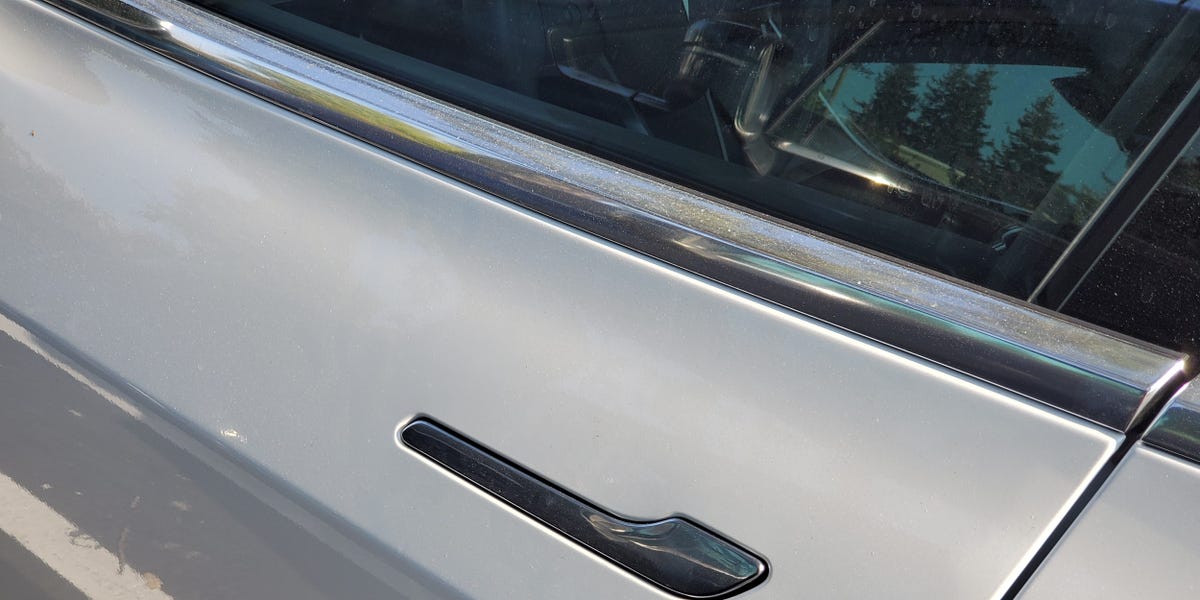Numerous Tesla owners have said they’ve been stuck inside their EVs after the cars suddenly lost power.
YouTuber Tom Exton claimed that his Tesla Model Y ordered him to pull over before it suddenly lost power and left him unable to exit.
Exton followed the instructions for the manual release to open the door, but he said this “somehow broke the driver’s window.”
The ability to open a car door mechanically, from both inside and outside, should always be obvious, without having to find any instructions.
Yeah, how is this not illegal? This seems really dangerous in the event of a crash.
Airplanes don’t have mechanical connections to their control surfaces anymore. They use triple or quadruple redundant fly by wire systems. But they’re that safe because of the FAA, not just out of the goodness of their heart. We need car regulation bodies to be closer to the FAA in stringency.
IMO the biggest difference between standards in flying and driving is the training and requirements toward operators. Imagine having a DUI being a strong indicator that you’ll never drive again, or basic driver training taking 50 driven hours, in addition to stringent theoretical tests.
Or people needing to check their cars for safe operation every time they start it, and omitting it being a crime.
Or a significant percentage of the population being just medically disqualified from driving, especially over 60 years of age.
It would be a different world for sure.
I’ve always been strongly of the opinion that driving is a privilege, not a right and you have to prove you can properly handle the vehicle to strict standards. These vehicles kill and injure so many people every year because of awful driving and awareness.
Now public transit on the other hand, should be a right.
Who cares if it’s legal…… the Muskinator thinks it’s ‘cool’ 😎
It’s no different than a steering wheel and brakes. It doesn’t matter if there’s some advanced electronics augmenting (or even controlling) those systems: there need to be a bomb-proof mechanical linkage as a backup.
Tesla doesn’t use steer by wire, but some other car company do. It’s actually really nice for having a high steering ratio at low speeds and a low one at high speeds to be more precise.
Plus breaks have been brake by wire for years now without mechanical connection.
Brake by wire isn’t really very common afaik. Mercedes had EBC at some point but stopped using that system. It also had the downside that the SBC unit had to be replaced every so often to guarantee a working brake system.
From the wiki:
Ford, General Motors, and most other manufacturers use the same general design, with the exception of Honda, who designed a notably different design.
Brake-by-wire is used in most common hybrid and electric vehicles produced since 1998 including all Toyota, Ford, and General Motors Electric and hybrid models.
Seems pretty common to me.
The three main types of brake-by-wire systems are: … electro-hydraulic brakes (EHB) which can be implemented alongside legacy hydraulic brakes and as of 2020 have found small-scale usage in the automotive industry; and electro-mechanical brakes (EMB) that use no hydraulic fluid, which as of 2020 have yet to be successfully introduced in production vehicles.
The question now is what the other quote was talking about, seems a bit unclear to me. I omitted the electronic parking brake in the quote.
EDIT: As of now I could find references to a total of 6 car models implementing brake-by-wire, two of which are already discontinued: Toyota Prius, Lexus RX 400h, Mercedes E and SL(both discontinued), Alfa Romeo Giulia and the Chevrolet C8 Corvette.
Again, considering the current amount of models on the market, that’s far from common
The Chevy Volt, for instance, has brake-by-wire, but I don’t think they advertise it as such. Most regenerative braking systems require brake by wire to function effectively, because you need to use the regen at higher speeds and physical brake at lower speeds, but only want the user to have one brake pedal.
Do the brakes brake by wire, or break by wire?
They give a feedback to a sensor which communicates over electrical wires to the brakes.
Brakes. That’s what he meant.
Thanks, sorry fixed now
“Brake by wire” doesn’t mean there isn’t a mechanical linkage, just that the “primary” means of transmitting brake pressure is electrical.
Between safety regulations, liability, the the potential for a PR disaster there isn’t a single road legal car for sale (yet) that doesn’t have a backup hydraulic or other mechanical system – the brakes must work if there’s a catastrophic electrical failure.
Goddamit my whole life i thought by wire meant like physical tensile wires. Never realized theyre talking about electronic systems where the information is transmitted electronically.
I can’t find which, but some vehicles seem to not have mechanical backup.
EHBs can be implemented by-wire, without legacy hydraulic systems and mechanical connections. In such a case, fail-operational redundancy is implemented, allowing the vehicle to brake even if some of the brake systems fail.[1]
https://www.mdpi.com/2227-9717/11/4/994
https://www.sae.org/publications/technical-papers/content/981109/
EHBs are fairly common, but they don’t preclude the use of a backup master cylinder system. A pure EHB has been a “goal” for a long time since eliminating the master cylinder and linkages would simplify design and manufacturing cost. So far nobody has been able to convince regulators or their legal team they can sell a car without one, though.
Pure electrical throttles have been the standard for a while now.
I don’t see why critical controls like that – if you even want to make them automatic – can’t have manual and automatic modes coupled.
If you lose power steering, you can still steer a vehicle, though you’re going to have to use a lot more muscle.
Tesla’s retract the door handle for better aerodynamics. So you can’t open it mechanically from the outside without the handle to hold. I don’t know how the inside works. Plus they don’t have mechanical keys, so the lock is already electronically controlled.
Maybe instead of engineering stupidly complex electronic door handles they could just, I don’t know, design a simple mechanical door handle that is also aerodynamic? These gimmick “features” automakers keep insisting on add pointless mechanical complexity, pointless areas of failure that are expensive to repair, and aren’t even something many consumers care about, or in many cases are overly complex hassles they actively don’t want.
I’d be interested to see how much actual power savings you get from a more aerodynamic door handle anyway, but it seems that this could be handled by a simple locking flip down cover over a recessed handle if the savings is actually non-negligible.
A flip down cover may be an option, but I’d worry about ice build up. How do you make sure you can always open the cover? If you add a mechanical assist, your back to your original problem.
I think it’s likely the vibe and aesthetics though that caused Tesla to go with their super sleek ones over some sort of cover.
You add drag any time there’s a divit in the panels. There’s lots of vortexes and disruption that happens just because of how your hand is shaped and where it needs to go.
There might be a better way to do it, but the other car companies haven’t done anything yet that I’ve seen to drastically reduce the drag from the handles.
Customers want range and saving money. If it does that without extra hassle, it makes sense. But that’s still up in the air. Especially with Tesla’s anti right to repair making things more difficult all around.
It’s also completely possible to make entirely mechanical non-electronic flush car door handles. They’re less of a shiny gimmick than the electronic ones, and less convenient than many standard handle types, but are entirely possible to do. You could also hypothetically do a version that is both electronic and manually operable with the same components, entirely negating the stupidity of an electronic door opener with an entirely separate mechanical backup, provided you are willing to sacrifice frameless windows.
I doubt that door handle contribites anything measurable to the aerodynamics of the car. The truth is that musk thinks it looks cool regardless of how annoying it is if anything goes wrong.
I found a 12% figure. Aerodynamics are a primary driver of range, which is a major ev selling point. A 12% drag decrease is huge, because you can carry less battery which means you can have a smaller motor, lighter frame, leading to even more range. So it would be very important if that is true.
The retractable door handle design allows radical aerodynamic designing for the side body panel. Retractable door handles are invisible handles that contribute by about 12% to reduce the drag coefficient of vehicles. Retractable door handles eliminate the issue of airflow bulge creation, air flow turbulence generation, and air flow pressure conservation. The decreased drag coefficient will also contribute to increasing the fuel efficiency of vehicles as there will be low drag generation resisting the movement of vehicles through the airflow. Amey Vikram, a lead analyst at Technavio for automotive components research
You can still have protrutionless handles without making them electronically retractable. Just have a spring-loaded metal flap that you push in with your hand
You’ll still get the icing issues, where you need to be able to get in even with a thick layer of ice over the handle. But that does sound like a really good solution otherwise.
I find it hard to believe that 4 door handles (being made flush with the door), reduces drag by 12% . Are there other articles you can share?
That’s just what Google came up with, sorry. I don’t have time to research more right now. I do know a rear view mirror on an f350 has more drag than an entire Tesla, so aerodynamics are not always intuitive.
That’s a plausible claim. If you find it hard to believe, maybe you should go back to the wind tunnel.
i agree. and this isnt just a tesla thing. plenty of other manufacturers are going this route, tesla might be the worst though especially the 3/y rear seat release. when the i8 was released i watched a video on youtube where a salesman and a tech were showing the car off. the tech mentioned that in training they kept breaking the emergency release inside the car. if a tech cant get out in training then how the fuck is anyone supposed to use it in a real emergency?
I imagine firemen/EMS/Cops are going to get annoyed with all the motorized door handles and just start breaking windows when ever they’re responding to something.
Absolutely. If your car is on fire, you shouldn’t be digging around looking for a latch, you should be pulling that handle and exiting in seconds. This design is going to kill people.
The number of automotive interfaces that we need to start strictly regulating because of trendy bullshit is getting fucking stupid.
A car door handle should be a mechanical device that’s plainly obvious to anyone who’s used a door handle, like, ever.
If phones are too dangerous to use while driving, then so is a fucking tablet glued to the dashboard.
I shouldn’t need a camera to use reverse, just quit adding blind spots.
A steering wheel should be just that — a wheel.
Blinker control should be a stalk pointing to the driver’s side door and self cancel.
And so on…
The fucking LED brighter than the goddamn sun headlights needed to be regulated 7 years ago
Funny thing about reverse cameras, they became a safety standard and requirement since 2020. Too many toddlers getting run over because you can’t see when they run behind the car below deck, even in an old car with a low trunk.
im not against backup cams and sensors. they are useful. to me the amount of aids for stupidity needs to go away. instead of having people, ya know, learn to look where they are going they just merge over and if the car doesnt yell at them theyre oblivious to whatever is around them.
I shouldn’t need a camera to use reverse, just quit adding blind spots.
The last time I used the backup camera in my car, I misjudged the distance to the car behind me and hit it, doing $1000 worth of damage. Never again. I look behind me now like I used to.
Cameras don’t have depth perception.
Lol so because you made a dumb mistake backup cameras are bad LMAO
No, lack of depth perception is a bad thing when reversing a car. I’m not sure why you think that’s some sort of controversial opinion.
Because ive never heard of anyone else ever making the same dumb mistake as you. They put the lines on the screen to show you the depth and once you hit the red danger zone you have a few more inches before you hit anything, so it’s pretty laughable you stepped on the gas too hard and blamed the camera.
But idk if there are statistics on backup cameras being dangerous, please share and i will go rip it out of my car right now!
Well that must be it. Everyone else must be vastly superior to me. Thanks for clearing that up.
I mean sure, it’s recommended that you look behind you even if using a backup camera, but those are just other stupid people saying that like the people who make the cars and state driving manuals.
Same link says backup cameras save lives . . .
I never said it wouldn’t save lives.
Blinker control should be a stalk pointing to the driver’s side door and self cancel.
Curious on your opinion where it should go on right wheel drive cars (and no, I don’t think converting the population of a whole country to “fix” it is realistic). I’ve seen it on both sides and it’s somewhat funny to rediscover.
That’s why I said “pointing to the driver’s side door”.
On LHD cars, the stalk is on the left. On RHD cars, the stalk is on the right.
on RHD cars it depends on the market. Japan has it on the right, UK―on the left. It’s a mess.
Oh really? I didn’t know that. I’ve only driven Japanese RHD cars, they all had the indicator stalk on the right side of the wheel. The number of times I turned switched on the wipers before turning…
I don’t know if that’s a tesla thing, or just cars in general these days (as I have an old vehicle and don’t ride in many others), but not having a fucking manual door opener seems really, really dumb.
it’s over engineering at it’s finest. Also included is the motorized pop-out door handles.
So the pop out handles on evs make a little sense. The goal is to reduce wind drag as much as possible. At least on mine (not a Tesla) you can still interact with the handle without the car exposing it.
Not having a manual way to open from the inside? No way in hell is that ok.
The wind drag on the handles is so negligible youd see a larger performance boost simply washing the bugs off the surface.
Cars aren’t moving fast enough that such short protrusions really matter.
It isn’t until cars start getting to race speeds that aerodynamic forces become … important.
Does it reduce drag? Yes. Is it smart to do so? Not so much. This is like all the cars that pulled out spares to get under the Obama era mpg requirements. Does it increase mileage? Sure. Is it smart to do so?
No. Wind drag on handles is most certainly not negligible. Even small protrusions on an otherwise smooth surface can have a significant effect. That effect is hard to model - you can’t just eyeball it.
Drag is proportional to windspeed squared.
Aero matters to fucking cyclists. It absolutely 100% matters to motor vehicles, especially in the context of EV range anxiety.
Just don’t fucking dunning-kruger, FFS. Surely you realise that automotive engineers have specific education that you don’t have. I don’t mind you being wrong, it’s the arrogance that pisses me off.
Aerodynamics are a primary driver of range, which is a major ev selling point. A 12% drag decrease is huge, because you can carry less battery which means you can have a smaller motor, lighter frame, leading to even more range.
The retractable door handle design allows radical aerodynamic designing for the side body panel. Retractable door handles are invisible handles that contribute by about 12% to reduce the drag coefficient of vehicles. Retractable door handles eliminate the issue of airflow bulge creation, air flow turbulence generation, and air flow pressure conservation. The decreased drag coefficient will also contribute to increasing the fuel efficiency of vehicles as there will be low drag generation resisting the movement of vehicles through the airflow. Amey Vikram, a lead analyst at Technavio for automotive components research
Unless they have a source for this i.e actual peer reviewed paper, this sounds like marketing.
I agree. It reads like ChatGTP or something.
Engineering stuff in production isn’t peer reviewed the same way new research and discoveries are in academia. Companies usually produce estimates and sell them, and their reputation and trustworthynes is based on the quality of their predictions. I don’t know how trustworthy this research group is in the industry, but it at least seems to be big.
Aerodynamics are a primary driver of range, which is a major ev selling point. A 12% drag decrease is huge, because you can carry less battery which means you can have a smaller motor, lighter frame, leading to even more range.
at the cost of… safety (getting locked inside during a crash… first responders being locked out,), reliability (they break enough to justify a class action); and ease of use… the 12% drag reduction isn’t actually that huge. Particularly when you translate that into range extension. 10% reduction leads to 5% range. in the case of a model s, that’s about 15-20 miles per charge cycle.
And I doubt very much that 12% isn’t inflated. The entire article you linked below is a marketing pitch for the people that make said handles.
If it really was that substantial, you’d have seen cars going to hidden/flush/shaved handles back in the Obama fuel efficiency standards era. You know. When they were removing spare tires to get a little extra MPG. (this is also why EV’s aren’t coming with spares. to squeak out a little bit more range. Compared to the door handles… a lot more range.)
Further, the handles don’t have to be motorized. You can have mechanical latches on flush-mounted handles. The entire design started with aesthetics and “cool” factor. which is why people are getting trapped in them and you know, getting trapped and dying. yep. “12%”…but hey, you might die because of it.
oh, by the way, the cost replace on of those over-engineered handles? about a grand. I’d rather sacrifice the range, to have a car whose door actually works reliably. but idunno. maybe I’m just weird.
There’s only a small handful of cars that have primarily electronic door handles. Teslas are the worst because opening the door without power is very different than opening it with power and sometimes breaks the window. I think it was Mercedes or someone who has a power lock but the manual release is part of the same lever, you just pull it out farther.
Also wasn’t there a famous video of BMW showing how to mechanically perform every task on their all electric sports car? From car doors to hood releases to way more niche things 99.9999% of people will never use or even know exists?
It was the I8. The techs were talking about all the little things you can do to break stuff on the car because of how insanely designed it all was. The techs kept breaking the door releases, and you need to jam screwdrivers in the hinge for the hood which requires at least two people to open to avoid breaking or deforming it.
Teslas are just overrated they dont do anything better than other ev cars, they were just first to mass market, which is great but doesn’t mean it’s a good purchase today.
This is textbook bad engineering.
My Toyota has this thing called a door handle
Heh, peasants with their ancient car doors. It doesn’t count as a car until you unlock it with your fingerprint and credit card information and bash your head four times on the roof while getting in.
I don’t normally use the word “literally”, but… Teslas are literally death traps. Their door releases are all extremely hidden and impossible to locate if you haven’t been trained to find them. It’s like they are trying to kill people.
Woah, buddy don’t think like that, let me reset that neural link for you.
Have a nice day.
The Model 3 owner’s manual states that “only the front doors are equipped with a manual door release.”
Well clearly anyone in the rear could just go out the front doors. And there’s absolutely no conceivable way that would ever not be possible, right?
Huh, this must be new? My Model 3 and S both have rear hardware manual open methods.
The Model 3 one is so easy to access that most of my passengers used it instead of the button.
There’s a little hole next to the electric door handle where you can poke a straightened paper clip… oh oops, that’s the cd player, not the door.
Reason #286 to never own a god damned stupid Tesla.
Cars are required to have manual releases by law; it’s just shitty how Tesla appears to be skirting those rules by hiding these manual releases behind inconvenient placements and locations…which is going to get people killed someday when one of these damn things catch fire.
The new Lexus RX has this door tech as well. I couldn’t open the door in the showroom.
Walked out of Lexus right away.
I feel like these people are incredibly disingenuous. If I’m in a hot car and want to make an exaggerated example out of what I think is bad design, I act like these people. If I’m in a hot car, stuck and panicking, I’m thinking about how much a window costs for about half a minute, and then I break a window.
It’s actually not very easy to break car windows out from inside a car without a tool. You can do it, but it’s harder than you’d think (like, I wouldn’t want to try doing it in a car which fell into a lake or something).
I guess I just assumed most people have one of those window breaking tools that cost like 5 dollars.
So I’ll just throw out my personal anecdote, as a Model 3 owner. Every single person who’s ever gotten into my car for the first time cannot find the electronic button that opens the door, to the point that I got little vinyl decals with a door open symbol on them to indicate that button opens the door. Usually what happens for first-time passengers is one of two things:
- Someone can’t find the button to open the door and immediately grabs the mechanical manual release and opens the door just fine (as long as they’re in the passenger seat, as the rear seats do not have one. I agree that is dumb.)
- Someone finds the button and presses it, then the window rolls down slightly (about half an inch) and the door unlatches and partially opens. The person then thinks they just rolled down the window and doesn’t just push the now-opened door, so the latch re-engages after a moment. I then tell them “push the button and then open the door” and then it’s fine.
I agree that the way to open the door, even from the outside, is not intuitive when compared to what most people are accustomed to. Any time someone gets in for the first time I have to explain “press the big part with your thumb and then grab the handle”. But it takes no more than half a second to figure out if you’re the least bit observant. Hell, when I first got the car I drove my friend around for a few weeks before realizing the beeping when the passenger’s door opened was because he used the manual mechanical door release instead of the button every time. He literally found the manual release more easily than the intended button for opening the door, and just thought that was the right way to open it until I told him otherwise.
I had a car in my 20s that trapped me inside, because the door handle broke and the window wouldn’t roll down.
Apparently Tesla is making cars as crappy as my 1985 Monte Carlo I had when I was 21.
You need power to open the door? Every day I learn more and more how piss poor the design is for these cars.
No, there’s a manual release. It’s normally hidden but it’s there in case of the battery dying.
I’m a robotics and mechatronics engineer in the automotive manufacturing space.
A few things I will never bend on, no matter how good the tech gets: Mechanical braking system Mechanical link from steering wheel to tires Manual door locks and handles Mechanical trunk/fuel door releases
Things I prefer to be mechanical: Fuel pump Carburetor Timing
Personally I drive a 1970 c20. It has a carb with throttle body injection, and electric pump with mechanical back up. An HEI distributor with electronic advance that still works if the electronics fail. I love the convenience of tech but it needs a robust back up.
Why on god’s green earth would any engineer prefer carburation to fuel injection?













